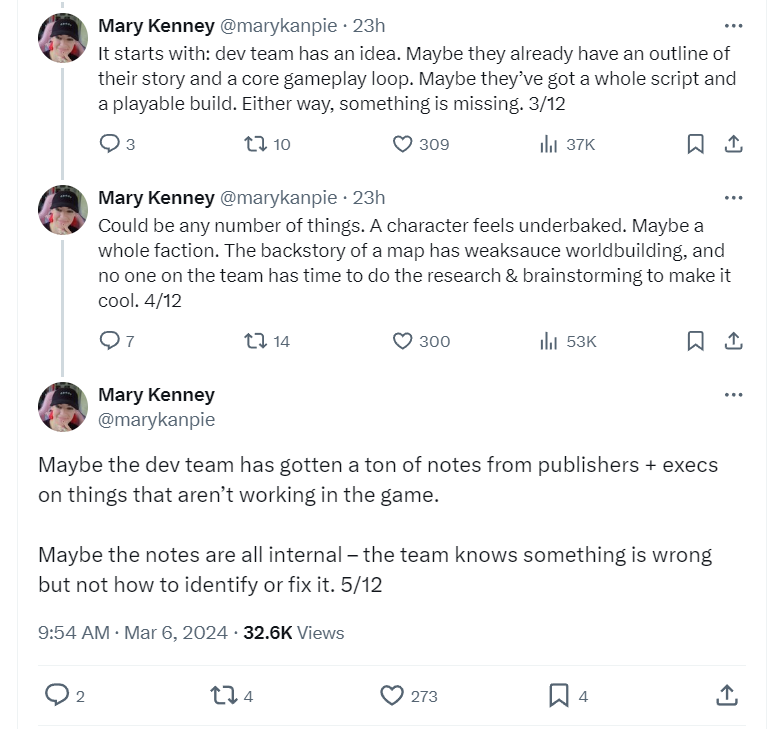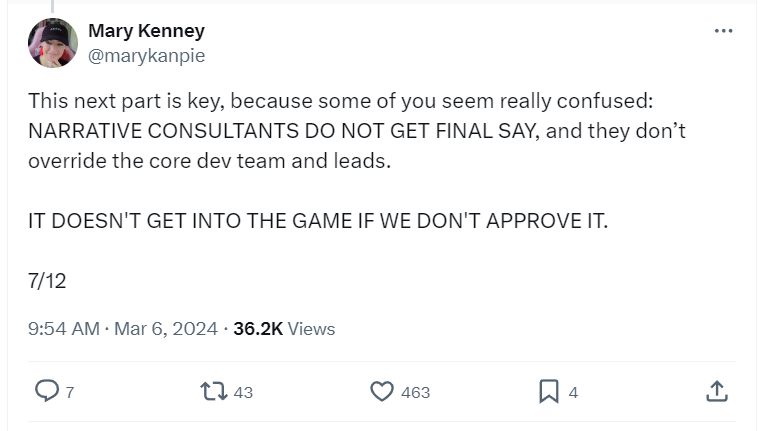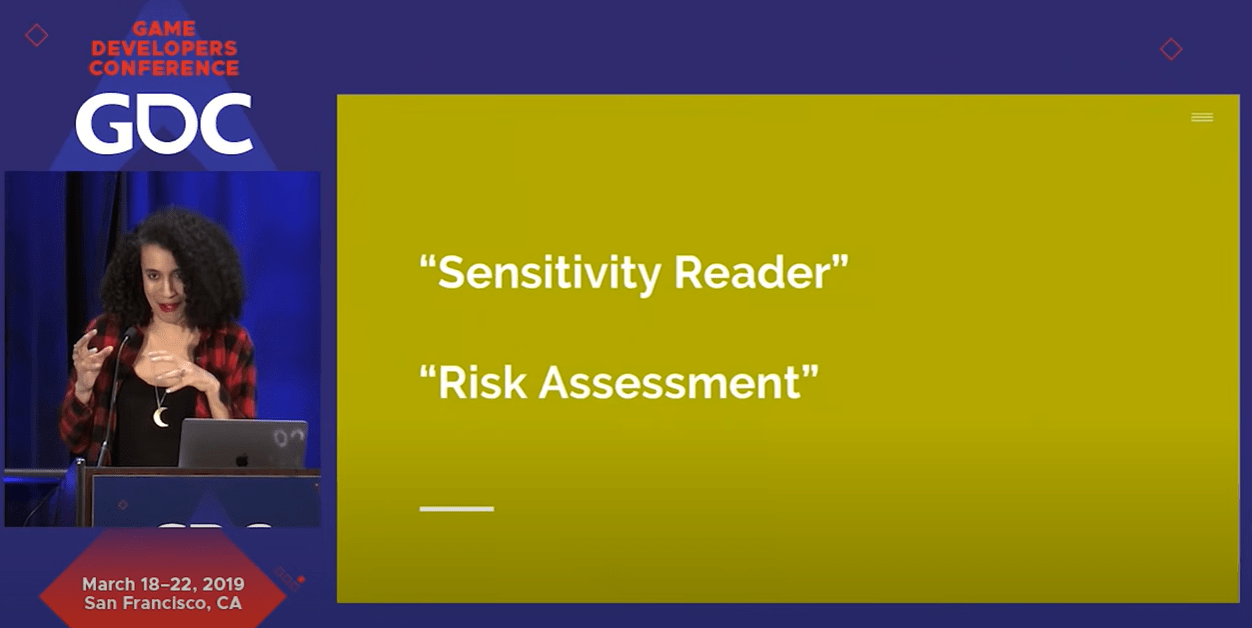Mary Kenney, the former Associate Narrative Director at Insomniac Games who was working on Marvel’s Wolverine, announced that she’s joined CD Projekt Red.

Mary Keneny via The Genuine Chit-Chat Podcast YouTube
Kenney posted to LinkedIn, “Without further ado, it’s time to announce my new job! Today was my first day as a senior writer at CD Projekt Red (best known for The Witcher series and Cyberpunk 2077).”
She added, “I can’t wait to talk more about my project, I’m thrilled to be getting back into RPGs, and my team is talented, welcoming, and just flat-out cool. Here’s to a new adventure.”

Mary Kenney on LinkedIn
Kenney recently detailed in an interview with Dual Shockers in May that everything must be done to push the LGBTQ+ agenda. She reacted to a GLAAD report bemoaning the lack of LGBTQ+ characters in video games describing the report as “heartbreaking.”
She also stated, “The GLAAD report tells us something key – games are a way for LGBTQ people to socialize. But it also tells us something heartbreaking: that LGBTQ gamers don’t feel that developers are thinking of them when they design games.”

A screenshot from Marvel’s Wolverine (TBA), Insomniac Games
Kenney added, “There are so many LGBTQ developers, and we want what players want – to design experiences that tell the player we’re here, we’re important, and we belong.”
In order to obtain this, she declared, “We need to pull every lever we have. Characters, community support, mechanics, to make it so.”

A screenshot from Marvel’s Wolverine (TBA), Insomniac Games
Not only has Kennedy made it abundantly clear that she will do everything in her power to push the LGBTQ+ agenda, she defended Sweet Baby Inc. after working with the consultancy group on Marvel’s Spider-Man 2.
In a 12-post thread to X, Kenney attempted to justify and defend Sweet Baby Inc.’s pushing of woke ideology into video games. She wrote, “Some of you don’t seem to understand how narrative consulting on games works, but don’t worry: I do! Yes this is about Sweet Baby, because I’ve worked with that team, and they’re one of the finest in the biz.”

Mary Kenney on X
Kenney then shared a disingenuous breakdown of what Sweet Baby Inc. does by X user 8BitClosedFist. He says, “‘Wokeness is killing gaming.’ Here we go. I have avoided the conversation around Sweet Baby Inc. for so long, but now it’s getting out of hand. Basically, when a game is being made some people will hire them to help them writing a dialogue or character design of certain types of characters. Spoiler alert: it usually involves stories and characters that isn’t the default.”
He continued, “Now anti-woke people call it one of this and they flock to it like flies on a turd. They’ll tell you they’re the reason Kill the Justice League and Arkham Knight are bad games. They’ll say they’re the reason why Spider-Man is dating a deaf woman, why Joel lost in golf, and why they can’t edge to their favorite characters, and it all sounds ridiculous because, from the bottom of my heart, it is.”
“But they won’t mention that they worked on games like God of War: Ragnarok, Alan Wake 2. They won’t tell you precisely what they worked on, what pieces of dialogue did they add to what game and how because they don’t know. It’s not public knowledge. Some of the clowns are even going as far as to say they are the reason for the layoffs, which makes no sense.”

A screenshot from Alan Wake II (2023), Remedy Entertainment
“If you are still confused as to why something like this would exist, let me break it down to you. Let’s say I’m a young black gamer who lives in Los Angeles. So I start a service to say, ‘Yo, if you come up with a character or story that involves a young, black gamer who lives in Los Angeles, you should talk to me about it because I kind of know what that’s like.’ So someone’s creating a movie and they say, ‘Yo, we have this character who is a young, black gamer who lives in Los Angeles, would he wear something like this in the winter?’ I can then look at the character and say, ‘Hmm, add a little bit more drip here, add some drip there. Even though it’s winter, we don’t need a puff jacket, we’re chilling,’ he said. “They say, ‘All right, bet.’ Move on.”
“Second scenario, a show comes out. They say, ‘Yo, we got this character who is a young black gamer in Los Angeles, would he say something like this?’ I say, ‘Hmm, we kind of overpronunciate our R’s a little bit more. So it wouldn’t be brotha. It would be brother.’ Now, those movies, those shows they come out. Some of them might still be trash. Some of them might be hits, but I did my job. The rest is up to them. That’s essentially what Sweet Baby Inc. does. That is now way, shape, form, or fashion an issue with gaming,” he asserted.
Finally, he concluded, “In fact, it helped us get more interesting, better characters or else every character in the video game would still be Aiden Pearce from Watchdogs or Old Boy from Days Gone. Sorry, that s**t is boring.”
If samus was revealed a women today they woulda called it forced diversity pic.twitter.com/lJk1ifIQ7T
— 8BitClosedFist 🔜 PAX West? (@8BitClosedFist) March 4, 2024
After sharing this video, Kenney posted, “It starts with: dev team has an idea. Maybe they already have an outline of their story and a core gameplay loop. Maybe they’ve got a whole script and a playable build. Either way, something is missing.”
“Could be any number of things,” she continued. “A character feels underbaked. Maybe a whole faction. The backstory of a map has weaksauce worldbuilding, and no one on the team has time to do the research & brainstorming to make it cool.”
“Maybe the dev team has gotten a ton of notes from publishers + execs on things that aren’t working in the game,” Kenney went on. “Maybe the notes are all internal – the team knows something is wrong but not how to identify or fix it,” she added.

Mary Kenney on X
Kenney then shared, “Wherever you are in development, and wherever the notes are coming from, the problem is the same: something’s wrong, and the team can’t figure out how to fix it. That’s when you call Sweet Baby.”

Mary Kenney on X
Next, she posted, “This next part is key, because some of you seem really confused: NARRATIVE CONSULTANTS DO NOT GET FINAL SAY, and they don’t override the core dev team and leads.
“IT DOESN’T GET INTO THE GAME IF WE DON’T APPROVE IT,” she emphasized.

Mary Kenney on X
Kenney then stated, “They CONSULT. They do research, pitch ideas, give feedback, and maybe even write scripts. But none of that gets into the game unless THE CORE DEV TEAM AGREES WITH IT. I’m going to keep saying that, because it’s key.”
“Sweet Baby is not, nor is any consulting group, coming in to wreck games,” she claimed. “They’re helping smooth out plots and deepen characters. They ease the burden on the core narrative team. They’re additive in every way.”

Mary Kenney on X
Kenney continued, “And if the dev team disagrees with them on something? The dev team doesn’t take the note.”
“It really is that simple,” she wrote. “So no, Sweet Baby did not kill your game. Of course they had nothing to do with the layoffs (duh???) They gave notes, pitches, advice, and research. The STUDIO made the final call on what went in the game. If you have beef, it’s with us. Keep it with us.”

Mary Kenney on X
All of this was a giant lie as Sweet Baby Inc. CEO Kim Belair admitted in 2019 that she and her company were opposed to “diversifying” a game with a Frenchman and advocated for a “person of color” character instead.
During a presentation at the Game Developers Conference she said, “I once worked on a project where they had an all-white cast where they expressed their desire, ‘Okay, we need to mix it up a bit. How about this character’s like stereotypically French.’ So they have a beret and they have like a striped shirt.’ And I was like, ‘Okay, if you need to do that, can we at least make them a person of color?’ And they said, ‘Oh no, that would be weird. They’re already French.’”
“So I want to do better than this,” she asserted.
In the same presentation, Belair admitted the company does indeed work to censor games through sensitivity reading.
She said, “We need sensitivity readers. We need risk assessment. And these are like, again, important services that I literally like list on every PDF that I send out to be like, ‘Hey, I can do risk assessment and sensitivity reading.’”

Kim Belair via GDC YouTube
And the silver bullet to Kenney’s narrative is how Belair described working with video game developers in that Game Developers Conference presentation.
She said, “If you’re creative working in AAA, which I did for many years, put this stuff up to your higher-ups. And if they don’t see the value and what you’re asking for when you ask for consultants, when you ask for research, go have a coffee with your marketing team and just terrify them with the possibility of what’s going to happen if they don’t give you what you want.”
“Because they have to consider– I say that out loud as a joke, but it’s actually very, very true because if you start to consider the people who are player and audience facing and you have to deal with mitigating harm and with keeping the sentiment around their game and their project positive, there’s like a genuine value that you could impress upon them both ethically and financially. You could say this is important,” she said.
Belair elaborated, “It’s also a valid discussion to have because if you’re working with a thin narrative budget and you work in AAA, I think you’ll be pleasantly surprised or dismayed by the amount of money that marketing can give you.”

Sweet Baby Inc. CEO Kim Belair via InclusionFX YouTube
What do you make of Kenney joining CD Projekt Red?